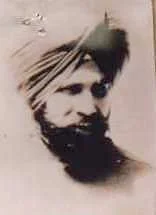Walking in the trail-blazing footsteps of Guru Nanak Sahib
/This week the Sikh world will celebrate the birth anniversary of Guru Nanak, an enlightened and profound thinker who not only challenged injustice and falsehood, but initiated a revolutionary movement to emancipate the world. He resisted crooked politics and unjust social orders to pave a new reality which gave rise to Sikh psyche.
Having studied many languages including Sanskrit, Persian and Arabic from an early age, young Nanak quickly surpassed renowned scholars in wisdom and spiritual prowess. His use of Sanskrit and Arabic terminology, to express some of his theological views found in the Guru Granth Sahib, shows he had mastered the vernaculars of ancient scriptures and contemporary governance.
Circa 1499 Guru Nanak describes how, as an unemployed bard/musician[1] he was bestowed with the task of propagating divine truth and thus spent the next 25 years travelling across modern day regions of India, Bangladesh, Sri Lanka, Tibet, Nepal, Bhutan, South West China, Pakistan, Afghanistan, Iran, Iraq, Saudi Arabia, Egypt, Israel, Jordan, Syria, Kazakhstan, Turkmenistan, Uzbekistan, Tajikistan, and Kyrgyzstan.
Wherever he travelled, in addition to spreading knowledge of the Creator, the Guru heavily criticized the political powers that ruled, and questioned the superstitious rituals of self-proclaimed religious leaders that had led people astray.
Guru Nanak's world vision was based on the notion that a leader must be guided by divine light for him/her to be of real service to the people. Such an authority should not be swayed by material pleasures but should create conditions in which love for the Almighty and spiritual values flourished.
On his trip to the South, Guru Nanak commended the Queen of Ceylon for her love of her subjects; "you gather your revenue and return it for the benefit of your subjects. The Chief who does not appropriate everything for oneself but gives to others in the name of the Almighty, is blessed".[2]
Where the Guru praised those, who honoured their office and performed their duties conscientiously, he equally condemned those who indulged in corruption. When referring to the Pathan administration, he said "The King administers justice if his palm is greased".[3] The assumption being that the whole paraphernalia of government is corrupt if officials at every level indulged in such acts.
He recognized the fallacies propagated by government officials and religious leaders who were both well-rehearsed in manipulating and exploiting the people for personal gains. He likened them to tigers, and their officials to dogs that went out to awaken sleeping people and harass them. He spoke metaphorically of how public servants inflicted wounds with their nails and the officials licked up the blood that was spilled. At the same time, he forewarned that all beings would inevitably be judged and those that had violated the people's trust would be disgraced.[4]
He was also outspoken about the discriminatory rituals that were commonplace across South Asia. One such ritual was the wearing of a piece of thread that was tied around one's neck, common amongst followers of Hinduism; the janeo. Hindus believed that without it, one would not be able to break out of the caste system and would forever remain in the lowest of castes.
When young Nanak was presented with the janeo, he spoke out against such superstitious beliefs and rebutted their claim.[5] He criticized the Hindu priest, "you buy the thread for a few shells, and seated in your enclosure, you put it on. Whispering instructions into others' ears, the Brahmin becomes a guru. But he dies, and the sacred thread falls, and the soul departs without it."[6]
Similarly, Guru Nanak was critical of Muslim rituals[7] and refused to accept the misconceptions that had enraptured the masses. He continuously shook the foundations upon which these self-proclaimed leaders stood.
He likened the current Age to a knife in which the rulers are butchers; where righteousness has sprouted wings, and flown away.[8] Highlighting the hypocrisy of what they preached and what they practiced, the Guru constantly scrutinized their actions. There is no ambiguity in what he wrote; "the sacred marks on their foreheads, and the saffron loin-cloths around their wastes; in their hands they hold knives - they are the butchers of the world".[9] The Guru adopted a no holds barred approach when exposing the duplicity of the men that abused their positions of power and authority.
Another way in which Guru Nanak challenged social norms was the way in which he championed women's rights. He denounced the ritual of Sudak which was widespread amongst the followers of Hinduism. This was a superstitious belief that having given birth, a woman remained unclean for a specific amount of days, the exact number itself depended on the caste to which the women belonged. Guru Nanak a stern critic of the caste system, condemned this practice.[10]
Guru Nanak recognized that at its very core the Brahmanical domination was traditionally very rigid, based solely on a hierarchical model where one's rights as an individual were limited to the caste in which one is born. An unyielding restriction was placed on one's ability to break out of the caste system and further disparities were placed on womenfolk.
Guru Nanak exposed the errors prevalent within the Brahmanical system, in the same way he was outspoken and blunt with his view on the Mughal rulers and their discrimination against fellow humans. His mission remained centred on the idea of uplifting a people from the slums of spiritual blindness and worldly bigotry that had plundered humanity.
In this way the Guru remained vocal and continued to question the cowardice of so called leaders. One such incident occurred during the impending invasion by Mughal Emperor Babur. The Yogis had refused to defend their people, relying instead on recitation of mantras and assuring the people that their efforts to remain passive and chant mantras would blind the Mughal forces.
When the Mughal forces attacked, Guru Nanak states "Millions of religious leaders failed to halt the invader, when they heard of the Emperor's invasion. He burned the rest-houses and the ancient temples; he cut the princes limb from limb, and cast them into the dust. None of the Mughals were blinded and no one performed any miracle". [11]
The Yogis lacked the courage and bravery to oppose the brute of Babur's forces and chose to abandon their people. The Guru thus highlighted the importance of standing up against injustice and oppression, which when the time came, was the same philosophy adopted by successive Gurus and later the Sikh themselves.
He condemned empty rituals such as fasting and other forms of penance adopted to achieve enlightenment. The austerities of which the Yogis were so proud, were of no value to the Guru, like the counterfeit coin, which may appear genuine but is ultimately rejected as it does not contain the necessary properties. The Guru was astute when he held discussions, whether he was in the heat of Baghdad or the cold foothills of the Himalayas.
Having exposed the falsehood that was flowing throughout the world around him, Guru Nanak set up a base in Kartarpur from where he initiated the Sikh Panth. The Guru removed superstition and hypocrisy that was so prevalent amongst the other religions of the world and established a kingdom of truth, built on the strongest of foundations. [12]
As Bhai Gurdas comments, he established the authority of his doctrines and started a new path devoid of any impurity.[13] Roaring like a lion, the Guru recognized that humanity had been led astray mainly by the corruption and falsehood of the ruling elite but also in part due to the ritualistic idol worship that had entered the sanctity of spiritual centres.
The State naturally labelled Guru Nanak an outlaw for his views and actions which they considered outlandish and in direct opposition to their rule. For this charge he was imprisoned during the tenure of Mughal Emperor Babur. However, the Guru remained resolute in laying the ideological and physical foundations of the Sikh Nation which revolutionized some whilst alarming others. That has been the pattern throughout Sikh history and is the reason Sikhs have faced opposition and near extinction since inception.
The pursuit of Sikh sovereignty has been a fundamental aspect of establishing the Guru's principles. Whether it was the Khalsa Republic of the early 18th century; the subsequent Sikh Confederacy; the Sikh Raj of the 19th century or the current Sikh movement for Khalistan, the Sikhs have always understood the need to establish political autonomy to truly implement the ideology of the House of Guru Nanak.
As Sikhs across the world celebrate this week, lets also strive to walk in the trailblazing footsteps of our Guru who condemned false creeds, hollow scriptures, isms, pieties and all religious and political hypocrisies[14] to galvanize the Sikh movement and help reshape the world around us.
Footnotes
[1] Guru Nanak, Guru Granth Sahib, Raag Maajh, Ang 150
[2] J S Bains, Political Ideas of Guru Nanak, Indian Journal of Political Science, 1962; Quoted in the Sikh Review, November 1961 p44
[3] Guru Nanak. Guru Granth Sahib, Raag Asa, Ang 339
[4] Guru Nanak, Guru Granth Sahib, Raag Malaar, Ang 1288
[5] Guru Nanak, Guru Granth Sahib, Raag Asa, Ang 471
[6] Guru Nanak, Guru Granth Sahib, Raag Asa, Ang 471
[7] Guru Nanak, Guru Granth Sahib, Raag Maajh, Ang 140
[8] Guru Nanak, Guru Granth Sahib, Raaj Maajh, Ang 145
[9] Guru Nanak, Guru Granth Sahib, Raag Asa, Ang 472
[10] Guru Nanak, Guru Granth Sahib, Raag Aasaa, Ang 472
[11] Guru Nanak, Guru Granth Sahib, Raag Aasaa, Ang 418
[12] Bhatt Satta & Balwant, Guru Granth Sahib, Raag Raamkalee, Ang 966
[13] Bhai Gurdas ji, Vaaran, Vaar 1
[14] Professor Puran Singh, Spirit of the Sikh, Chapter 1




The UK government’s continued actions show that they are still trading bodies for gold. The Sikhs will continue to serve the Guru Panth, through their Dhan Man Thanh (body, mind, and wealth), and it is for Sikhs, and Sikhs alone, in the words of Shaheed Bhai Jaswant Singh Khalra, to decide “who is the terrorists and who is the righteous”.